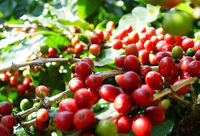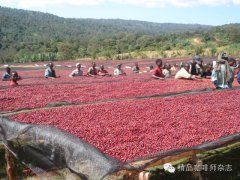The Best Coffee in Zaire Coffee is grown in the northeast of Zaire Coffee.
Boutique coffee has a strict grading system. In general, raw beans are preserved as "parchment coffee beans" in the form of endocarp after processing, and the endocarp is removed before export. Go through a strict grading process to ensure the uniformity of quality. And its preservation and transportation in the process of protection is very important, such as temperature and humidity control, ventilation control, avoid odor adsorption and so on, if these do not do well, then no matter how high-grade beans will no longer become fine.
Its Arabica coffee beans have long been famous for both quality and quantity.
The best Zaire coffee is grown in the north-east of the country, particularly in the provinces of Oriental and Kivu, where in the past excellent beans and giant beans have been produced. Unfortunately, the high-quality coffee produced in Zaqire is dwindling, but the taste of Zaire coffee is still excellent. Like Kenyan coffee, Zaire coffee has ideal acidity, rich aroma and moderate delicacy.
The coffee industry in Zaire has recently been gradually privatized and it is possible to raise prices in order to facilitate the investment necessary to revive the coffee industry. There are about 40, 000 hectares of arable land in Zaire for the cultivation of Arabica coffee beans and 220000 hectares for robuste coffee beans. Before Zaire became independent in 1960, the vast majority of coffee was grown on plantations. World coffee prices plummeted in 1989 and many farmers gave up their estates. Today, coffee is grown mainly by small farmers in Zaire.

Important Notice :
前街咖啡 FrontStreet Coffee has moved to new addredd:
FrontStreet Coffee Address: 315,Donghua East Road,GuangZhou
Tel:020 38364473
- Prev

What kind of coffee is high quality Zambian coffee suitable for in the afternoon? Kasama Coffee Origin
Boutique coffee has a strict grading system. Generally, raw beans are preserved in parchment coffee beans in the form of endocarp after processing, and the endocarp is removed before export. Go through a strict grading process to ensure the uniformity of quality. And it is very important to preserve the protection in the process of transportation, such as the control of temperature and humidity, the control of ventilation, avoiding odor adsorption and so on.
- Next

Introduction of coffee varieties in Colombia coffee producing countries located in northwestern South America
Colombia, located in the northwest of South America, is a beautiful country with a long history. Indians have lived on this land since ancient times. It was colonized by Spain in 1531 and gained independence in 1819. It was renamed in 1886 to commemorate Columbus, the discoverer of the American continent. In 1808, a priest transferred coffee from the French Antilles to Venezuela.
Related
- Does Rose Summer choose Blue, Green or Red? Detailed explanation of Rose Summer Coffee plots and Classification in Panamanian Jade Manor
- What is the difference between the origin, producing area, processing plant, cooperative and manor of coffee beans?
- How fine does the espresso powder fit? how to grind the espresso?
- Sca coffee roasting degree color card coffee roasting degree 8 roasting color values what do you mean?
- The practice of lattes: how to make lattes at home
- Introduction to Indonesian Fine Coffee beans-- Java Coffee producing area of Indonesian Arabica Coffee
- How much will the flavor of light and medium roasted rose summer be expressed? What baking level is rose summer suitable for?
- Introduction to the characteristics of washing, sun-drying or wet-planing coffee commonly used in Mantenin, Indonesia
- Price characteristics of Arabica Coffee Bean Starbucks introduction to Manning Coffee Bean Taste producing area Variety Manor
- What is the authentic Yega flavor? What are the flavor characteristics of the really excellent Yejasuffi coffee beans?

